Unit 7 Poems Grammar课件(26张PPT 内嵌视频)-2022-2023学年七年级英语下册同步精品课堂(牛津深圳版)
文档属性
| 名称 | Unit 7 Poems Grammar课件(26张PPT 内嵌视频)-2022-2023学年七年级英语下册同步精品课堂(牛津深圳版) |
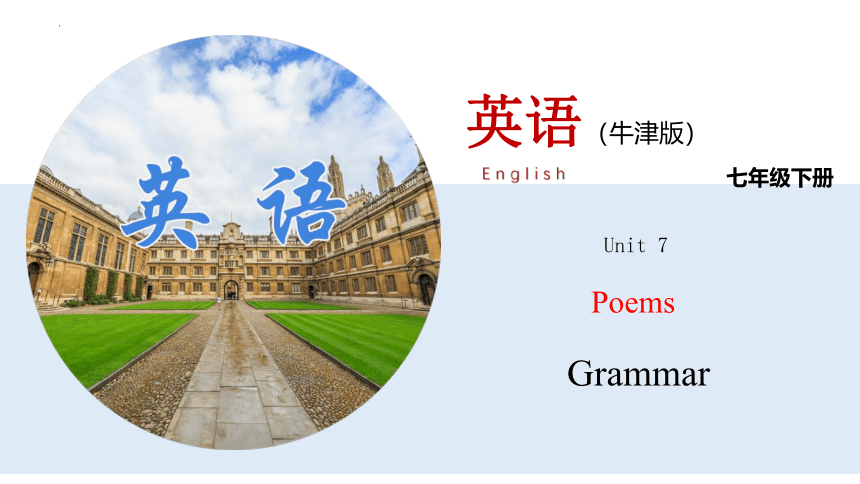
|
|
| 格式 | pptx | ||
| 文件大小 | 12.1MB | ||
| 资源类型 | 教案 | ||
| 版本资源 | 牛津深圳版 | ||
| 科目 | 英语 | ||
| 更新时间 | 2023-04-09 15:34:53 | ||
图片预览


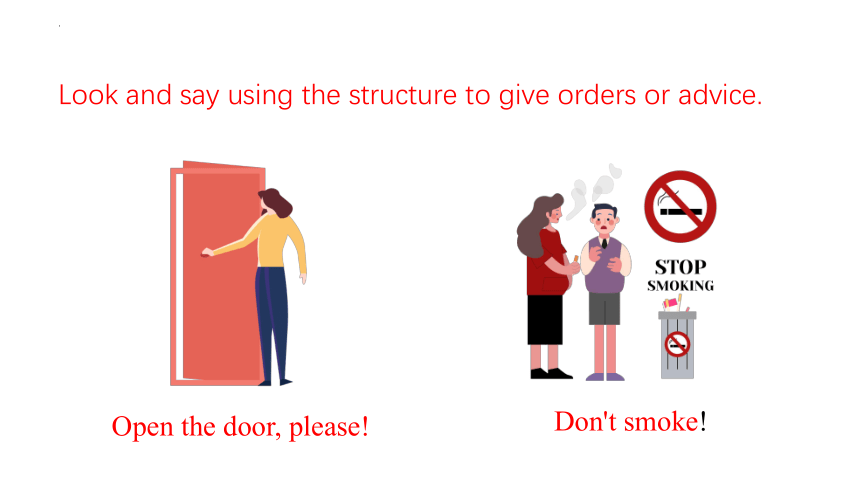
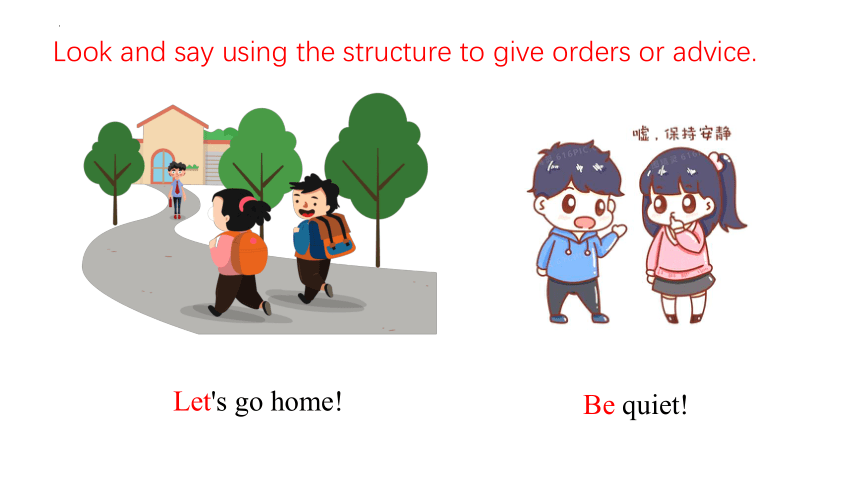
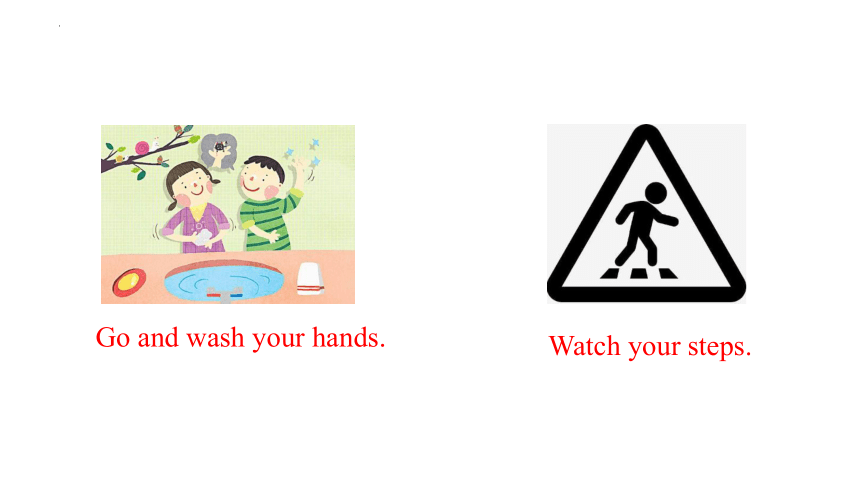

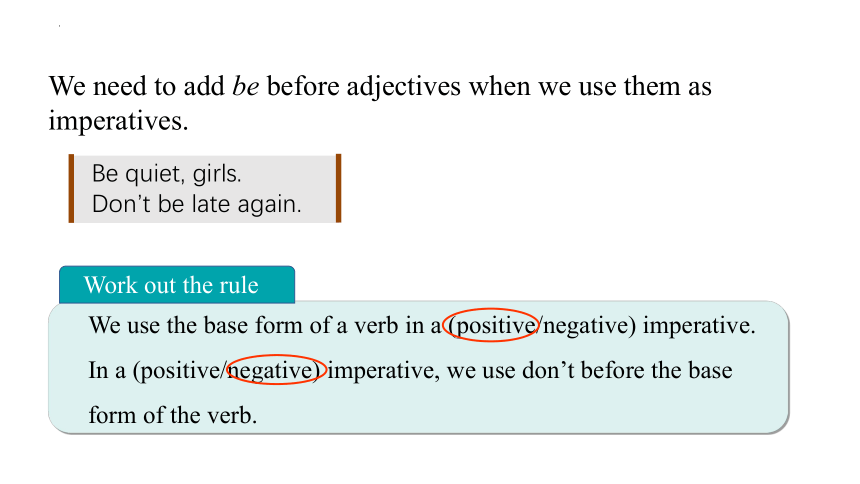
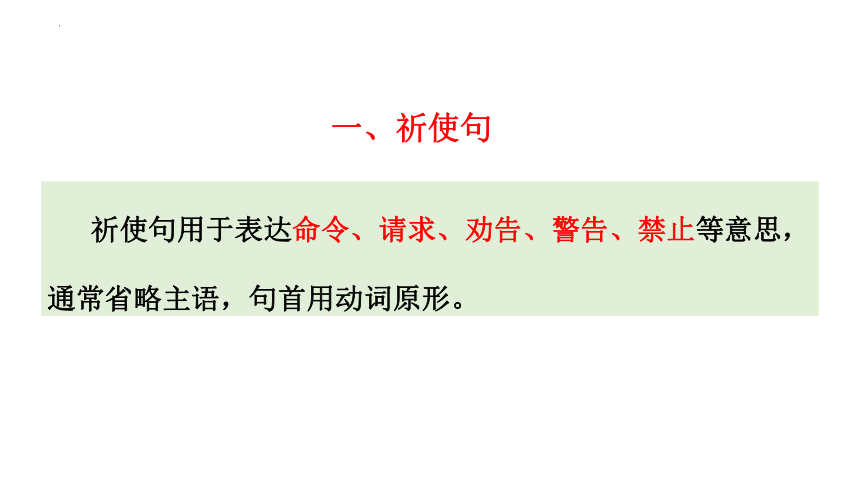
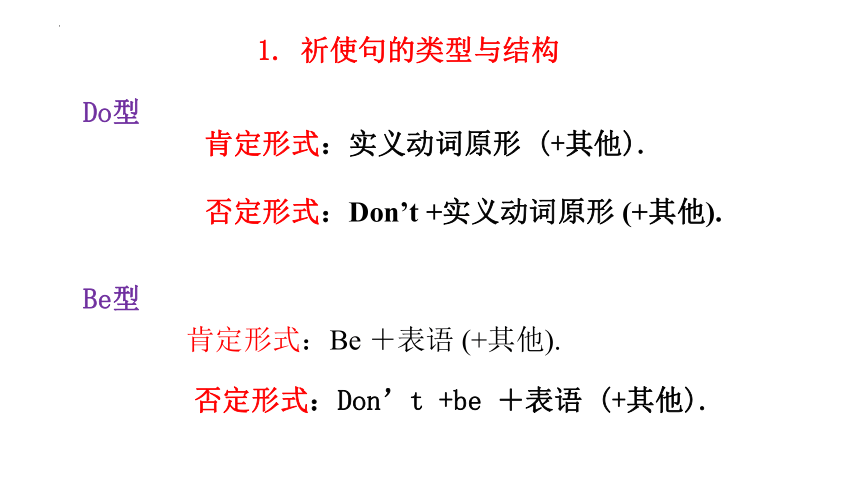
文档简介
(共26张PPT)
英语(牛津版)
七年级下册
English
Unit 7
Poems
Grammar
Watch the video
1
课堂导入
Open the door, please!
Don't smoke!
Look and say using the structure to give orders or advice.
Let's go home!
Be quiet!
Look and say using the structure to give orders or advice.
Go and wash your hands.
Watch your steps.
A Imperatives.
We use imperatives to give orders or advice. There are positive and negative imperatives.
Open the door, Daisy.
Don’t open the door, Daisy.
Let’s make a million smiles!
Things to remember
We can use please in imperatives. It is more polite.
Please turn off your phone.
Turn off your phone, please.
2
课堂活动
We need to add be before adjectives when we use them as imperatives.
Be quiet, girls.
Don’t be late again.
We use the base form of a verb in a (positive/negative) imperative.
In a (positive/negative) imperative, we use don’t before the base form of the verb.
Work out the rule
一、祈使句
祈使句用于表达命令、请求、劝告、警告、禁止等意思,通常省略主语,句首用动词原形。
Do型
Be型
肯定形式:实义动词原形 (+其他).
否定形式:Don’t +实义动词原形 (+其他).
肯定形式:Be +表语 (+其他).
否定形式:Don’t +be +表语 (+其他).
1. 祈使句的类型与结构
Let型
No型
肯定形式:Let+宾语+v.原形 (+其他).
否定形式:Don’t +let+宾语+v.原形 (+其他).
/ Let+宾语+not+v.原形 (+其他).
No+名词/动词-ing形式.
2. 祈使句的回答
回答祈使句时一般用will或won’t。回答肯定形式的祈使句用will,回答否定形式的祈使句用won’t。
例句:—首先,清洗这些蔬菜。
—First, wash these vegetables.
—好的,我会的。
—OK, I will.
Look at the picture. What will the teacher say Make sentences with the words from the box on page 95. Some of them must begin with Don’t.
1 Bill is eating in class.
2 Rose left the door open on a
windy day.
3 Jane is answering a question in
a low voice.
____________________________
____________________________
____________________________
Don’t eat in class, Bill.
Close the door, Rose.
Please say loudly, Jane.
bring close eat sleep speak louder turn to
________________________
4 James is sleeping at his desk.
5 Steven is looking at page 47.
He should look at page 74.
6 Mary brought her pet mouse
to school.
________________________
____________________________
Don’t sleepp in class, James.
Please look at page 74, Steven.
Don’t bring your pet to school, Mary.
Exclamations.
Sometimes we use sentences with emphasis and strong feelings. These sentences are called exclamations.
What + (a/an) + adjective + noun + subject + verb + !
How + adjective/adverb + subject + verb + !
What an interesting poem it is!
What beautiful flowers they are!
What bad weather it is!
How lucky we are!
How quickly the time passed!
How bright the stars are!
We can use a word or phrase as an exclamation, such as Oh no! or Lovely! We can also use a word or phrase with what or how to show strong feelings.
What an interesting poem!
What beautiful flowers!
What bad weather!
How lucky!
How fast!
How bright!
Work out the rule
We often begin an exclamation with the word _____ or ____. We often use “___” at the end of an exclamation. What
How
!
由what引导的感叹句
1. ① What + a / an+(形容词)+单数可数名词+主语+谓语!
② What+名词词组+主语+谓语!
What a fine day it is!
2. What+(形容词)+可数名词复数或不可数名词+主语+谓语!
What kind women they are!
What nice music it is!
由How引导的感叹句
(how用来修饰形容词、副词或动词。)
1. How+形容词(副词)+主语+谓语!
How hard the workers are working!
How clever the girl is!
How quickly the boy is writing!
2. How+主语+谓语!
How time flies! 时光飞逝!
注意
1. 当how修饰动词时,动词不跟着感叹词提到主语之前。
How fast the runner runs!
赛跑者跑得多快啊!
2. how与what引导的感叹句中的第一种格式(单数名词)一般情况下可以相互转换,转换后意义不变。
What an interesting story it is! = How interesting the story is!
What a beautiful building it is! = How beautiful the building is!
Rewrite the sentences below using exclamations with what or how.
1 You are wearing an old shirt.
______________________________________________
2 The boys are very excited.
______________________________________________
3 They are friendly people.
______________________________________________
4 She studies very hard.
_____________________________________________
What an old shirt you are wearing!
How excited the boys are!
What friendly people they are!
How hard she studies!
B1
Lisa and Bob are talking about their plete their conversation with the exclamations from the box.
Oh no! How wonderful! What a lovely baby!
Lisa: Tom won the first prize in the speech competition.
Bob: _______________ He must be very happy.
Lisa: Yes. But Jeff hurt his leg when he played basketball.
Bob: _______ How is he feeling now
Lisa: He’s feeling better. By the way, our Maths teacher had a baby last month. Look, here’s a picture.
Bob: Wow! __________________
How wonderful!
Oh no!
What a lovely baby!
B2
3
课堂小结
1.We have learned how to imperatives to give orders or advice.
2.We have learned how to exclamations to show strong feelings.
选择最佳答案填空。
( )1. — Please ____ to return my book by Friday. I’ll use it on Saturday.
— No problem. I’ll finish reading it on Thursday.
A. don’t forget B. not to forget C. not forget D. forget not to
( )2. — ____ clever the girl is! — So she is.
A. How B. What C. How a D. What a
( )3. ____ wonderful news it is! All of us are very happy.
A. What a B. What C. How a D. How
A
A
B
4
课堂练习
( )4. — ____nice day it is today! Let’s go out to play, shall we
— That’s a good idea.
A. How B. What C. How a D. What a
( )5. ____ beautiful flowers they are!
A. How B. What C. How a D. What a
( )6. ____ tall the girl is!
A. How B. How a C. What D. What a
A
D
B
二、将下列句子翻译成英文。
1. 请坐下。
2. 请安静。
3. 别傻了。
4. 别忘了给这些花浇水。
5. 让我们坐火车去那里吧。
6. 不要打开电脑。
7. 永远都不要放弃!
1. Sit down, please. / Please sit down.
2. Be quiet, please. / Please be quiet.
3. Don’t be silly.
4. Don’t forget to water the flowers.
5. Let’s go there by train.
6. Don’t turn on the computer.
7. Never give up!
三、填入适当的词完成下列感叹句。
1 _______ difficult homework we had yesterday!
2 _______ cute dog it is!
3 _______ interesting the story is!
4 _______ bad the weather in England is!
5 _______ honest boy Tom is!
What
What a
How
How
What an
英语(牛津版)
七年级下册
English
Unit 7
Poems
Grammar
Watch the video
1
课堂导入
Open the door, please!
Don't smoke!
Look and say using the structure to give orders or advice.
Let's go home!
Be quiet!
Look and say using the structure to give orders or advice.
Go and wash your hands.
Watch your steps.
A Imperatives.
We use imperatives to give orders or advice. There are positive and negative imperatives.
Open the door, Daisy.
Don’t open the door, Daisy.
Let’s make a million smiles!
Things to remember
We can use please in imperatives. It is more polite.
Please turn off your phone.
Turn off your phone, please.
2
课堂活动
We need to add be before adjectives when we use them as imperatives.
Be quiet, girls.
Don’t be late again.
We use the base form of a verb in a (positive/negative) imperative.
In a (positive/negative) imperative, we use don’t before the base form of the verb.
Work out the rule
一、祈使句
祈使句用于表达命令、请求、劝告、警告、禁止等意思,通常省略主语,句首用动词原形。
Do型
Be型
肯定形式:实义动词原形 (+其他).
否定形式:Don’t +实义动词原形 (+其他).
肯定形式:Be +表语 (+其他).
否定形式:Don’t +be +表语 (+其他).
1. 祈使句的类型与结构
Let型
No型
肯定形式:Let+宾语+v.原形 (+其他).
否定形式:Don’t +let+宾语+v.原形 (+其他).
/ Let+宾语+not+v.原形 (+其他).
No+名词/动词-ing形式.
2. 祈使句的回答
回答祈使句时一般用will或won’t。回答肯定形式的祈使句用will,回答否定形式的祈使句用won’t。
例句:—首先,清洗这些蔬菜。
—First, wash these vegetables.
—好的,我会的。
—OK, I will.
Look at the picture. What will the teacher say Make sentences with the words from the box on page 95. Some of them must begin with Don’t.
1 Bill is eating in class.
2 Rose left the door open on a
windy day.
3 Jane is answering a question in
a low voice.
____________________________
____________________________
____________________________
Don’t eat in class, Bill.
Close the door, Rose.
Please say loudly, Jane.
bring close eat sleep speak louder turn to
________________________
4 James is sleeping at his desk.
5 Steven is looking at page 47.
He should look at page 74.
6 Mary brought her pet mouse
to school.
________________________
____________________________
Don’t sleepp in class, James.
Please look at page 74, Steven.
Don’t bring your pet to school, Mary.
Exclamations.
Sometimes we use sentences with emphasis and strong feelings. These sentences are called exclamations.
What + (a/an) + adjective + noun + subject + verb + !
How + adjective/adverb + subject + verb + !
What an interesting poem it is!
What beautiful flowers they are!
What bad weather it is!
How lucky we are!
How quickly the time passed!
How bright the stars are!
We can use a word or phrase as an exclamation, such as Oh no! or Lovely! We can also use a word or phrase with what or how to show strong feelings.
What an interesting poem!
What beautiful flowers!
What bad weather!
How lucky!
How fast!
How bright!
Work out the rule
We often begin an exclamation with the word _____ or ____. We often use “___” at the end of an exclamation. What
How
!
由what引导的感叹句
1. ① What + a / an+(形容词)+单数可数名词+主语+谓语!
② What+名词词组+主语+谓语!
What a fine day it is!
2. What+(形容词)+可数名词复数或不可数名词+主语+谓语!
What kind women they are!
What nice music it is!
由How引导的感叹句
(how用来修饰形容词、副词或动词。)
1. How+形容词(副词)+主语+谓语!
How hard the workers are working!
How clever the girl is!
How quickly the boy is writing!
2. How+主语+谓语!
How time flies! 时光飞逝!
注意
1. 当how修饰动词时,动词不跟着感叹词提到主语之前。
How fast the runner runs!
赛跑者跑得多快啊!
2. how与what引导的感叹句中的第一种格式(单数名词)一般情况下可以相互转换,转换后意义不变。
What an interesting story it is! = How interesting the story is!
What a beautiful building it is! = How beautiful the building is!
Rewrite the sentences below using exclamations with what or how.
1 You are wearing an old shirt.
______________________________________________
2 The boys are very excited.
______________________________________________
3 They are friendly people.
______________________________________________
4 She studies very hard.
_____________________________________________
What an old shirt you are wearing!
How excited the boys are!
What friendly people they are!
How hard she studies!
B1
Lisa and Bob are talking about their plete their conversation with the exclamations from the box.
Oh no! How wonderful! What a lovely baby!
Lisa: Tom won the first prize in the speech competition.
Bob: _______________ He must be very happy.
Lisa: Yes. But Jeff hurt his leg when he played basketball.
Bob: _______ How is he feeling now
Lisa: He’s feeling better. By the way, our Maths teacher had a baby last month. Look, here’s a picture.
Bob: Wow! __________________
How wonderful!
Oh no!
What a lovely baby!
B2
3
课堂小结
1.We have learned how to imperatives to give orders or advice.
2.We have learned how to exclamations to show strong feelings.
选择最佳答案填空。
( )1. — Please ____ to return my book by Friday. I’ll use it on Saturday.
— No problem. I’ll finish reading it on Thursday.
A. don’t forget B. not to forget C. not forget D. forget not to
( )2. — ____ clever the girl is! — So she is.
A. How B. What C. How a D. What a
( )3. ____ wonderful news it is! All of us are very happy.
A. What a B. What C. How a D. How
A
A
B
4
课堂练习
( )4. — ____nice day it is today! Let’s go out to play, shall we
— That’s a good idea.
A. How B. What C. How a D. What a
( )5. ____ beautiful flowers they are!
A. How B. What C. How a D. What a
( )6. ____ tall the girl is!
A. How B. How a C. What D. What a
A
D
B
二、将下列句子翻译成英文。
1. 请坐下。
2. 请安静。
3. 别傻了。
4. 别忘了给这些花浇水。
5. 让我们坐火车去那里吧。
6. 不要打开电脑。
7. 永远都不要放弃!
1. Sit down, please. / Please sit down.
2. Be quiet, please. / Please be quiet.
3. Don’t be silly.
4. Don’t forget to water the flowers.
5. Let’s go there by train.
6. Don’t turn on the computer.
7. Never give up!
三、填入适当的词完成下列感叹句。
1 _______ difficult homework we had yesterday!
2 _______ cute dog it is!
3 _______ interesting the story is!
4 _______ bad the weather in England is!
5 _______ honest boy Tom is!
What
What a
How
How
What an
